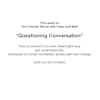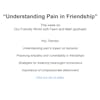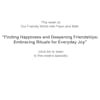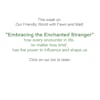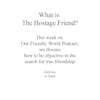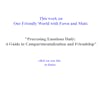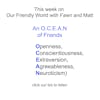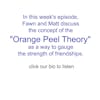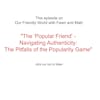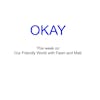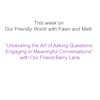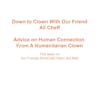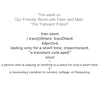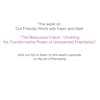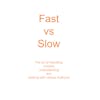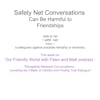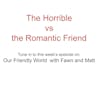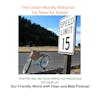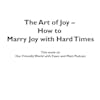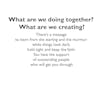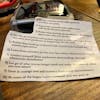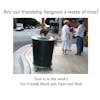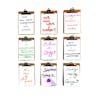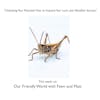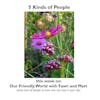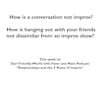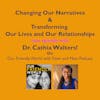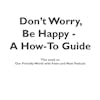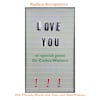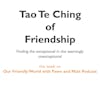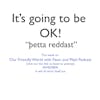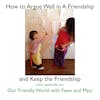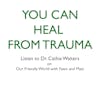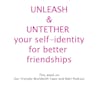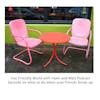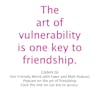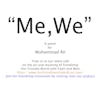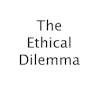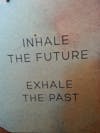
"Processing Emotions Daily: A Guide to Compartmentalization and Friendship"

This episode explores the concept of compartmentalization and its effects on daily life, relationships, and emotional well-being. Fawn and Matt discuss the importance of daily cleaning, both literal and metaphorical, to prevent emotional clutter from accumulating and impacting mental health. They share personal experiences, including traumatic events and coping mechanisms, to illustrate the significance of addressing emotions as they arise rather than storing them away. The conversation emphasizes the value of vulnerability, communication, and self-care in maintaining healthy relationships and fostering personal growth. Overall, the episode offers insights into navigating life's challenges while striving for emotional balance and connection.

This episode explores the concept of compartmentalization and its effects on daily life, relationships, and emotional well-being. Fawn and Matt discuss the importance of daily cleaning, both literal and metaphorical, to prevent emotional clutter from accumulating and impacting mental health. They share personal experiences, including traumatic events and coping mechanisms, to illustrate the significance of addressing emotions as they arise rather than storing them away. The conversation emphasizes the value of vulnerability, communication, and self-care in maintaining healthy relationships and fostering personal growth. Overall, the episode offers insights into navigating life's challenges while striving for emotional balance and connection.
#Compartmentalization, #Emotional Well-Being, #DailyCleaning, #RelationshipMaintenance, #CopingMechanisms, #Vulnerability, #Self-Care, #EmotionalSpringCleaning, #NavigatingFriendships, #TraumaAndRelationships, #VulnerabilityInFriendships, #Self-CareForEmotionalWell-Being, #DailyCleaningForMental Health, #CompartmentalizationAndRelationships, #HealthyRelationshipMaintenance, #PersonalGrowthThroughEmotionalBalance
I. Introduction
A. Opening conversation about cleaning and its significance in various contexts
B. Reference to martial arts school tradition and religious practices
II. Personal Experiences with Cleaning
A. Fawn's daily cleaning routine and its connection to managing clutter
B. Discussion on the importance of addressing emotions as they arise
C. Matt's perspective on compartmentalization and the need for in-the-moment coping
III. Compartmentalization and Cleaning Metaphor
A. Definition and explanation of compartmentalization
B. Comparison of emotional storage to physical clutter in the home
C. Analogy of emotions as "toddlers" seeking attention
IV. Impact of Compartmentalization on Relationships
A. Personal stories of dealing with trauma and the subsequent emotional challenges
B. Discussion on the concept of capacity in friendships and relationships
C. Reflection on the role of compartmentalization in facing life-threatening health crises
V. Importance of Daily Emotional Cleaning
A. Fawn's realization prompted by Farnoosh's perspective on daily cleaning
B. Metaphor of emotional cleaning as a way to create space for positive experiences
C. Mention of yoga philosophy and the idea of hoarding emotions
VI. Practical Tips for Emotional Maintenance
A. Fawn's suggestion of the 90-second rule for processing emotions
B. Matt's emphasis on finding personal time for reflection and emotional release
C. The importance of communication and vulnerability in maintaining healthy relationships
VII. Closing Thoughts
A. Acknowledgment of the ongoing challenge of emotional maintenance
B. Reminder of the benefits of regular emotional cleaning for personal growth and well-being
C. Encouragement to embrace vulnerability, communicate openly, and prioritize self-care
Transcript- Compartmentalization
[00:00:00] I
Fawn: was talking to Farnoosh the other day, and we were talking about cleaning the house. Uh huh. In the Jewish religion, not just the Jewish religion, but it's interesting. Remember martial arts schools? For the new year, whenever we chose to celebrate the new year, you had to make sure that your entire life was all cleaned up and set in order.
That the dojo was clean. Everything. The floor, the shelves, everything. That all your debts were paid. Everything all straightened out. And we try to do that. I try to do that every day. Mhmm. Because I hate when laundry piles up and you have No clutter. Then you have a whole day of just doing laundry.
And that is A dread. So might as well do a little bit every day. Or as I walk from room to room, I clean as I go, but I'm always cleaning up. But anyway. That's because I'm messy. Speaking of which, are you ever going to unpack all the books we [00:01:00] moved
MATT: with? I told you. I told you I wanted to donate them.
And you're like, no. So I'm stuck.
Fawn: You're going to be sorry that you donated those books. You would think, but I won't be. You say that now. I do. Look, I wanted to donate certain, family heirlooms because I didn't want them around. Mm hmm. But now I'm kind of glad we have them. Mm hmm. Just, books, you don't want to get rid of books.
We're going to live in an age where books are a rarity. Yes, I know. And you have amazing books. Anyway, today we're talking about compartmentalization. Compa Compartmentalization. Hahaha.
MATT: But it's not a made up Moira word, it's a real word.
Fawn: I'm sorry, none of her words were made up, by the way. If you look them up, they're for real.
Anyway, just a slightly different accent. but anyway, I was listening to Farnoosh speak, she puts a lot of effort into it, I don't know if it's for Purim or for Passover, but like, you clean the whole house, you go through and you clean [00:02:00] everything.
Everything. Yeah, spring cleaning, I get it. No, it's more than spring cleaning. We should have her on so she can explain.
MATT: There's actually a tradition where when you clean a house, like the last time before you leave it, you burn your broom. That's a lot of brooms. When you leave it for the last time.
Fawn: Oh, yeah, that's why I don't like to move with a vacuum cleaner.
Because it holds the dust from the past. Is that right? Is that why? I don't know
MATT: why, it's just an interesting tradition.
Fawn: Well, yeah, I mean, mm. Okay, so, but it makes me think of So, I'm listening to Farnoosh, and she was very complimentary of me, saying, well, you know, you do this every day. And I'm like, do I though?
The way she's talking about cleaning. So I started looking around the house, and I started freaking out, so I started cleaning again. Like, with even more gusto. Because I'm like, I don't think I'm cleaning enough, [00:03:00] or well enough. So anyway, I looked at, I moved a shelf, and underneath it were kinds of, all kinds of dust bunnies.
That was my reaction. I felt I felt bad, so I started cleaning with even more fervor, but this always makes me think of, what is it that we're, oh, I can't pronounce it, you guys, compartmentalizing. Matt is Matt is I'm the king.
MATT: Guilty. I'm the king of compartmentalization.
Fawn: I like to clean as I go, so when emotions come up, I don't care.
You were really good about this, though, when the kids were toddlers. You didn't care where we were. If they were acting up, or there was a situation, it was going to turn into a teaching lesson. So if we we [00:04:00] looked forward to going somewhere for weeks or months, and we're finally there. And the kids had a tantrum or they did something that was inappropriate.
You're like, okay, we're going home now. And I was like, no. Can we just let it slide and talk about it later? You're like, nope, now. But you don't do that with emotions in life. You really don't. You compartmentalize everything. You put it on a shelf. And here's the problem. Once the crisis is over, so here's what it is.
Compartmentalization is when you, you deal with a situation as it's happening. So there's a crisis. There's a crisis. You deal with a situation, but you take your emotions and put it away. So you just deal with the situation. Anything you're feeling, any emotion, you put it on the shelf or you pack it [00:05:00] away.
And, hello, it gets stored in your body. What are you talking about? It's over there on the shelf. And here's the thing. The crisis is gone. Life is life and new things pop up. Before you know it, you're hoarding all these things on the shelf or in the back room or in the basement. So you're hoarding them, but yes.
No, you are. What? I know you mean that.
MATT: I'm rubber,
Fawn: you're glue. But, okay, maybe you're better now. Because you ran into , a life threatening health crisis, I think, because of it. So you're better now. You're better now. And that's all it took, really. You almost dying? Yeah, exactly. Thanks. So now, Now we're dealing with a whole whole set of other issues.
Because when other people are around you, they love you, you don't know how they're going to act. Like, we thought our kids were resilient to what happened, but a few years [00:06:00] later, my suspicion is everything that they're going through now I think it stems from the major shock and the fear and the trauma that we had.
Not just, not only with you almost dying, there were other things that were happening, right? And we never really discussed it, we never really, um, It was so bad, so many bad things, so many hardships, that we just wanted to move through it. And look onto happier moments, right? Right. So we didn't live in it.
We didn't even discuss it. Meanwhile, I tried to discuss it, but then you were like, why are you taking us back there? Can we move forward? And I totally respect that, and I understand that. So I was caught between two worlds. I didn't know what to do. But, you know, I think, I don't know. I, well, I do know.
I think that. We really need to visit these emotions and not let them accumulate cobwebs and You know other creatures can [00:07:00] move in and go look at this Cave or look at this box. I can crawl into You don't know what what's gonna happen. It's like it's hoarding and Actually, this is one of the things in yoga.
It's it's I don't know if I can call it a sin, but it's hoarding. You're hoarding your emotions as opposed to going and cleaning house as you go, making sure that you have space for wonderful things in your life. And here's the problem. I, I didn't totally understand this, but so going back to the major trauma during this trauma, to add to the trauma.
I realized that people that I considered best friends disappeared because we were going through trauma. They disappeared to this day they don't know if we're alive. I've talked about this before. And I talk about it, um, more, I [00:08:00] talk about it a lot because of this. Because I think that this is one of the key things in our society that keeps us from Being together and keeps us from understanding what true friendship is and truly seeing each other and holding each other and creating a happier, healthier, friendlier society.
When all this stuff was happening, I was trying to deal with the trauma and then on top of it, as I said, then a new trauma was happening at the same time of watching all these people that you thought cared about you. completely disappear off the face of the planet. And I couldn't understand that, and that was extremely painful.
Like, it just added more pain. Thanks. Like, like I needed to handle more stuff. But, so years ago I studied spiritual response therapy with Robert Detzler. Years ago. Decades ago. And When we were [00:09:00] going through this, I was desperate to talk to someone, and the psychologists were not helping. Like, I went to one therapist, and I couldn't get through one sentence without crying.
And this one therapist was like, why are you crying? I'm like, because the love of my life almost died. Technically died, like, um, Um, whatever, you know, and we have kids, and It was really scary, and instead of trying to make me feel better or calming me down, she goes, well, everybody dies. At that precise moment, that's not the right thing to say.
It was not the right thing to say to me, so I left. I'm like, thank you for your For your patronage, whatever it is, whatever this is, thanks. Bye. Um, actually I waited until the hour was up because I was too chicken to leave. I [00:10:00] should have just left. So, I turned to my colleagues who were spiritual response therapists.
I called and I was talking to one. I told her what was happening and I, and I briefly said, Oh, and these people disappeared like my, our best friends. And she said, it's all about capacity. I think that your idea of what friendship is, is way, it carries more weight than anyone can handle.
And then that made me feel bad. I'm like, well. Wow, I didn't realize I was putting such burden on people. And she's like, no, it's not that, it's that, it's not that you're putting a burden on someone, but your idea of friendship is totally different, and you have a different capacity than they do. And that's what you have to realize what friendship is, or with all relationships, is the idea of capacity.
How much can someone hold? How [00:11:00] much are you able to hold? And if you have so much, oh here's the word again, compartmentalized, if you have so much in storage already that you haven't revisited, if you haven't gone through the emotions that were so hard for you and you've put them away, you're in a way dis I think, you become disassociated with that emotion.
You don't know how to handle that emotion. You haven't experienced it. You haven't walked through it. And I think it becomes a trigger when a friend or someone around you has that emotion. It's a trigger for you so you want to run away. You don't want to see this person. You don't want to be friends with them.
That's my theory. So I think it's really important to do laundry every day. to wipe your shelves of the dust every day. And not only go with a feather duster and like, move the dust around because it'll [00:12:00] come right back on the shelf, right? Get a damp cloth. Or a Swiffer. No. A damp cloth and clean things up as you go.
Anyway, that's, that's my talk for
MATT: today. And where you talk about capacity, I think about vocabulary, honestly. It's, I don't think it's necessarily as much of a case of people don't have the capacity. It's that people don't have the vocabulary for some of this stuff. I disagree. Well, I respectfully disagree.
Which is why I'm bringing up this point. Grief especially is one of those things that I think in our society, sadly, people have a nasty habit of going through alone. And so, It's like, and they go through it alone because when you go talk to people they're like, oh, just move on with your life or Get over it or here let me tell you about my grief because that'll somehow or another [00:13:00] make you feel better about yours
Fawn: It does make me feel better if you tell me how you got through your grief.
Yeah, but people
MATT: don't like to say that. They like to say, Oh, yes, indeed, yes, I get it, your, you know, your pet hamster died. Well But then there was this occasion where my da da da da da died
Fawn: and I think in that case you're not allowing the person to feel. Remember, a few years ago we did an episode on the 90 second rule?
That if you feel an emotion entirely, it takes, I don't know, someone said 90 seconds, it could be 5 minutes, I don't know. But you have to feel an emotion thoroughly and wait for it to physically move, you have to wait for it to physically move through your body and then it will have left you. It's no longer a physical thing, because chemically, you've already Allowed for it to be [00:14:00] experienced, and you're able to move on, to move forward.
But if it's so harsh or it's so big that you cannot imagine, it's like drowning. You can't imagine living with it for a few minutes. You can't. So you put it away. But then what happens is that that turns into days, weeks, months, or years. Where you have to eventually feel it. And yes, there's vocabulary, but if you don't have space because you've stored everything up and you can't handle any more coming in at you, it does, it is a matter of capacity.
MATT: And there you go, once, once, once again, as I am the king of compartmentalization. You know, I, I always like to refer to it as, in the moment I can deal with whatever it is [00:15:00] while maybe you're feeling all the emotions that tend to paralyze us. I remember one time I was, I was on a horse, bad for vegans, but I was on a horse and he bucked up.
He like lifted his front legs, I mean, he was, and I just grabbed the reins and I just pulled him. I don't know why I did that to one side just to let him know, Hey, I'm still here, buddy. And then five minutes later, I was like, holy, I could have gotten thrown. But in the moment, no,
Fawn: but I understand. But the point is to remember, I stored this emotion.
Let me go pick it up.
MATT: See, I was about to get there, but he didn't let me. You just cut me off. I allow me to pause, have the dramatic pause. See,
Fawn: I'm afraid you're going to store it away. The dramatic pause.
MATT: Okay. Cause that's just it. You're right. You do have to visit. You do have to take some time. You do have to feel comfortable by yourself.
Cause those are the moments, for me at [00:16:00] least, where these things come back up. And all of a sudden I'm sobbing uncontrollably and I don't know why. And that's part of it. And that's part of the process.
Fawn: And Yeah, then it's hard to get time to yourself. But I
MATT: need, I need my space to do that. I need to be alone because people are gonna immediately leap to, What's wrong with you?
And, you know what? It's past trauma, it's I don't know what, It's something I just have to get out. And that's just what it is.
Fawn: Can I say something right now? I don't wanna, I don't wanna interrupt you. Go ahead. I find that, in most cases, whatever it is that you're going through, that you don't want to experience in front of someone else, like experience an emotion coming up where you want to cry, I guarantee you, whoever you're surrounded by, in some way also is experiencing something similar, so if you say, oh, this brought this up for me, and you brought up, [00:17:00] if you have no choice, like you're around other people, if you can, um, Shield yourself just enough without becoming like your own separate bubble that no one can come inside of.
Like it's not a wall. If you can share of yourself with enough little protection. Share enough of what it is that you're going through. It could be helping that person. You don't have to do it on your own. I think that's part of what creates a bonding friendship. And you are absolutely right.
And a quicker way to friendship because you're being real. You're not holding anything back. If they can't handle it, you realize they can't handle it. I heard something like, You know when you have a friend. That is in the rain with you when they totally could be somewhere else dry, but they're going to stand in the rain with you and get wet.
[00:18:00] You know what I'm saying? Uh huh.
MATT: I know, but it's, to me, it's layering emotion on top of emotion. So I'm either going to be dealing with the emotion of, well, this person's being really sweet, or I'm going to be dealing with the, oh, what a flip and let down this person is. That's true. And I have to just Focus on a thought.
I have to focus on a word. I have to focus on one feeling and it's one, one, one, one, one. It's one of
Fawn: each. I get it. I get it. But what happens when you don't have time, Matt? What happens when you don't have the time to have to yourself? Well, your
MATT: body's gonna make you have the time
Fawn: at some point, well, uh, we don't wanna go there again.
MATT: Exactly. So that's why you need to take the time. And the time is in the, in the bathroom. The time is, you know, waking up a half an hour early, the time is going to bed a half an hour later, whatever it is. And the point is going grow a bike ride. Go beat yourself up on your bike.
Fawn: Why do you have to beat yourself up?
Look at you. [00:19:00] Why does it have to be beat yourself
MATT: up? Sometimes, sometimes it does have
Fawn: to be. Well maybe you want to beat up the emotion out of you.
MATT: And sometimes I just, I want to, I want to use this magnificent machine that I was born with. and see what it can do. Let's, let's kick in the afterburners.
Let's see what, you know, my VO2 max looks like. Let's
Fawn: go. Okay. Well, we know that now, correct? Correct. Anyway, that's it.
I don't know, I
MATT: just, you, I mean, It's almost like I have to be at least 75 percent done with whatever it is in order for me to bring other people into the conversation.
Fawn: It doesn't have [00:20:00] to be that hard, But sometimes it is. I think it has to be a priority. How much laundry do I have? How much
MATT: dirty laundry do you want?
No, no, No, how much dirty laundry in your, in your laundry room? How much dirty laundry in your basement before you start cleaning
Fawn: it? And if you don't want to spend a whole Sunday doing laundry, that's no fun. Just do a small load every day, as you go. When you walk into a room and you see some dust, grab a cloth.
Why are you laughing? Because
MATT: I'm the one who does all the laundry
Fawn: in the house. Now you do. Now you do. You didn't before. You didn't
MATT: before. I'm the one who does all the laundry
Fawn: in the house. To be fair, the kids help. You put it in the wash, you take it out, and then they fold it and put it away.
MATT: You make it sound like that's the simplest
Fawn: part of it.
It's not like you're going in the river with a washboard and, like, you're, like, scrubbing
MATT: stuff. Well, no, because the rocks are right there, I can, you know, [00:21:00] bam the wet clothes against, for goodness sake.
Fawn: Oh my god. Okay. Are we going to get into a fight about who does more around the house?
MATT: No, because I'm going to lose that one.
Fawn: Okay. Alright. Anyway, now I forgot what I was saying. Okay. Basically,
MATT: I think what you're saying is don't compartmentalize. And what I'm saying is compartmentalize, but in the moments
Fawn: you need to Meanwhile, you still have, your closet is filled with boxes. And I'd love to take
MATT: them out, but you won't let me.
Fawn: Oh, please, I won't let you.
MATT: I said I wanted to donate all my books, and you're like, no. So, I'm
Fawn: stuck. By the way, they're not all books, I looked.
MATT: Yes, they're not all books, but they're mostly
Fawn: books. Just take care of it. Fine, you'll be sorry, I'm telling you. You don't want to get rid of those books. I got rid of a whole bunch of books years [00:22:00] ago, and to this day, I'm like, I wish I had those books.
A lot of them we had to go re buy. Thank you. I think it's important to have a beautiful library. Beautiful as in, It's nice to turn to a book, lean against the shelf, take out a book, and open the page and have someone talk to you.
MATT: And that's why I've got all my special books in the one tiny little bookcase.
Fawn: Yeah, but you don't know if the other ones will be special. Anyway, I don't want to have this fight. Just fix your closet. Just fix it. Now! But the other thing I wanted to say is, not getting smug. Like, I can Be smug in saying that, Hey, I clean every day, but meanwhile I have my issues, I have insomnia.
I have, I went for a massage for the first time in over eight years, and the person just massage the palm of my hand and I start crying hysterically. You know, there was stuff.
MATT: Well, yeah, I'm sure it was very painful.
Fawn: It was not painful at [00:23:00] all. It was the fact that someone was holding my hand. I hold your hand all the time.
It was different. It was like a kind, not that you're not kind. Oh, dang.
MATT: It's about to get
Fawn: worse, folks. It wasn't a lover's hand. It was just like pretty much a stranger holding your hand. It was just so sweet. It was just a split second of, like, total compassion. And it just made me cry because of all the emotion that I've stored away.
Of stupid people that you thought were your friends and were not. And it's so painful. And it's always going to happen. Because life is a garden. Not all flowers will stick around and some plants you need to pluck out. They're not good in your garden. Get them out of there. It's not easy. It's not, it's not [00:24:00] easy.
So anyway, I don't want to get smug and thinking, Well, I'm always cleaning and my house is spick and span. Is that a word? Yes. What does that mean? Is it derogatory? Another term that may not be good. Well, I can say my house is spotless and it's not true You know when Farnoosh said, you clean all the time I'm like, yeah, I do but do I clean every centimeter of the house and then I moved one of the shelves.
I'm like look at this It was probably me. I'm saying it's like, no, it's, it was my desk. It was, I'm saying that there's always something and it's good and it's, it's a good release. And I think that that doing that allows more space for having beautiful friendship because you're not bogged down with stuff that you're not even aware of.
, my photography [00:25:00] studio in Santa Monica, I never put anything up on the walls, everything was white. White couch, white walls. And it was because I felt like if I put anything up, everything was, demanding my attention. And that's art, you know? I I just think that emotions, when you put them away, when you pack them away, they're still shouting at you, they're still talking to you, all day, every day.
And you're ignoring them. Don't, don't look at me, I don't ignore them. Remember, a few years ago we talked about this, I said, it's like having a toddler. Your emotions that are packed away are like toddlers, you know how some toddlers are like, mama, mama, mama, mama, look, look, look at me, look at me, look at me.
And if you see most parents, they, because they hear it all day, every day. And there may be trying to have a moment with another adult to say something. But every time you talk, you're interrupted. So you tend to ignore and so the toddler, [00:26:00] same thing, like they're trying to get your attention and you're like, yeah, well, let me do this first.
Let me, let me finish my thought first, or let me talk to this person first, or let me do this first. And, but you're not communicating that with them, right? So they're like, mama, mama, mama, mama, mama. And then it turns louder and louder and then it turns into a tantrum because you're not paying them attention.
Think emotions are the same way. If you ignore them, then, yeah, it does turn into disease. We know too well. But anyways. Okay. So anyway. That's it. That's it.
MATT: Alright, take some time, do some spring cleaning.
Fawn: Every day. Don't even call it spring cleaning.
MATT: Well, I'm talking about dealing with like, the big ugly stuff that people have going on right now.
Yeah, if you do some deep spring cleaning then the daily cleaning
Fawn: not so much, you know what's so nice about it to before we go one more thing to add is When you feel like like as you're saying that Matt, I'm [00:27:00] like, oh my god. That's a herculean feat is to Do spring cleaning right? It's a big job. Yep. I don't want to do it I'd rather do something else.
But, if you do one little thing, it turns out, if you do one little thing, it cleans up a whole bunch of other things. So you don't have as much to clean as you think. And you feel so good for doing the tiniest task. You will feel so much better. So, to have a better society, to have a better Friendship. To have good things come into your life, I think, is to constantly clean up
and wipe away the old. Not, you know, not to get rid of the old stuff. What I'm saying is just, just, you know. Oh dear. Yes. Like taking a shower, right? Like bathing. You're wiping it off and you feel better. Same thing. That's it. Have a beautiful every [00:28:00] day, guys. If you need to talk to us, you know where we are.
Go to our website, send us an email. We love you so much. Have a beautiful every day. Be well.
New to Our Friendly World with Fawn and Matt?
Here are some great episodes to start with.
















